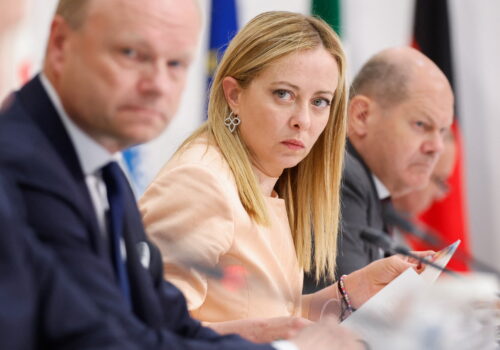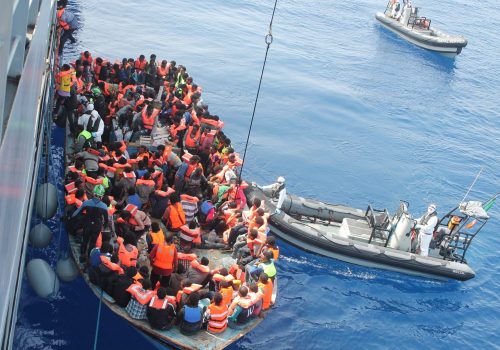Italy’s Mediterranean pivot: What’s driving Meloni’s ambitious plan with Africa
At the Palazzo Madama in Rome last week, Italian Prime Minister Giorgia Meloni unveiled an ambitious plan for Africa, and by extension, the Mediterranean. The Mattei Plan for Africa, which sets aside 5.5 billion euros in loans and grants for development projects across the continent, was presented on January 29-30 to a delegation of more than twenty-five African leaders.
With the plan, Italy is boldly positioning itself as an energy hub for Europe and as a regional power capable of independently engaging in Mediterranean affairs, separate from other European Union (EU) countries. Moreover, through five main policy pillars (education and training, agriculture, health, water, and energy), the plan could help spur economic growth in Africa, and by default, reduce some of the economic causes driving mass migration from the continent.
Can the plan succeed? Early criticism of it centers on its perceived ambiguity, on concerns that it could jeopardize efforts to address climate change, and on its potential use as a pretext for Italy to tighten its stance on irregular migration. However, amidst these apprehensions, there are grounds for optimism. The plan presents an opportunity for Italy to emerge as a prominent player in Africa and to shift from its historically reactive approach to irregular migration toward proactive and constructive solutions.
A renewed Italian role in the Mediterranean
Since assuming office in October 2022, Meloni has made the Mediterranean a focal point of her foreign policy agenda. From addressing irregular migration to reducing reliance on Russian energy, the motivations behind this agenda are clear: the Mediterranean Sea, with its strategic location as a gateway to three continents and its abundant natural gas and oil resources, is crucial for Italy. This truth holds as much weight today as it did historically when the Roman Empire sought to assert its dominance by controlling the Mediterranean region.
In her first year as prime minister, Meloni visited Algeria, Libya, Tunisia, and Egypt. During her first diplomatic mission, she orchestrated a two-day visit to Algeria alongside Claudio Descalzi, the chief executive officer of Italian energy company Eni, signaling an effort to further her predecessor Mario Draghi’s strategy of reducing Italy’s dependence on Russian gas. Throughout the visit, she emphasized a “virtuous model of collaboration” between African and European partners. She also took part in numerous photo opportunities with Algerian President Abdelmadjid Tebboune, to underscore her efforts to emphasize the warm relationship between Italy and Algeria.
In early 2023, Meloni continued her engagements with North African leaders, traveling to Tripoli, Libya, where she met with Prime Minister Abdulhamid Dbeibah to finalize substantial energy investment agreements, address migration challenges, and discuss security threats posed by Sahelian Islamist groups. During her visit, Eni and Libya’s National Oil Company signed an eight-billion-dollar gas investment deal aimed at facilitating exploration and production for both domestic and European markets. Additionally, Italy provided Libya with five ships for the Libyan coast guard to bolster patrols against irregular migration across the Mediterranean.
In July 2023, Meloni made two separate visits to Tunisia in under ten days, following a surge in migration from the North African country to Italy. Along with European Commission President Ursula von der Leyen and Dutch Prime Minister Mark Rutte, Meloni negotiated the signing of a memorandum between the European Union and Tunisia worth 150 million euros, aimed at revitalizing Tunisia’s economy and strengthening its coast guard capacities to combat irregular migration.
Middle power or global player?
Italy has long grappled with formulating a cohesive foreign policy, oscillating between assertiveness and mediation. During the Cold War, Italy assumed the role of a mediator, often acting as an intermediary between the United States and the Eastern bloc in the Mediterranean. Hindered by its struggling economy and internal ideological divisions, Italy failed to attain the status of an assertive, leading power capable of guiding rather than following.
Italy’s engagement in the Mediterranean has followed a similar path, vacillating between prominent and passive stances. In the 1950s and 1960s, Eni founder Enrico Mattei positioned the company to challenge the dominance of Western oil companies in North Africa through strategic alliances with countries such as Egypt under Gamel Abdel Nasser. These efforts were in part aimed at strengthening Italy’s role in the region.
But since the early 2000s, and especially in the wake of the Arab Spring in the early 2010s, Italy’s approach to the Mediterranean has been primarily reactive. Policies such as former Prime Minsiter Enrico Letta’s “Mare Nostrum,” aimed at tackling Mediterranean challenges through multilateralism and economic development, and former Prime Minister Paolo Gentiloni’s “Minniti Plan,” emphasizing border control and law enforcement, were chiefly reactive strategies to the perceived migration crisis gripping Europe. These strategies often lacked a cohesive long-term vision and strategic foresight, relying instead on short-term fixes.
A path to renewal
The Mattei Plan for Africa seeks to establish an Italian agenda that prioritizes Africa’s needs and avoids predatory practices. Through investments in infrastructure and renewed energy, Italy aims to reclaim an assertive role in the region.
For this repositioning to succeed, however, the Meloni government must avoid repeating past mistakes. Instead, it should adopt forward-looking approaches aligned with global trends, such as addressing climate change and providing green energy solutions, while forging lasting relationships with African elites committed to impactful policies. While short-term gains may appeal to transient foreign policy agendas, it is the pursuit of long-term benefits that distinguishes leaders with enduring legacies.
Alissa Pavia is the associate director of the Atlantic Council’s North Africa Program.
Further reading
Wed, Jan 31, 2024
Italy’s G7 presidency can be a breakthrough for the ‘West’ and the ‘Rest’
New Atlanticist By Paolo Messa, Karim Mezran
Rome is already working on revamping traditional power structures and fostering a new ethos—one that envisions new opportunities for partnership.
Thu, Aug 3, 2023
Irregular migration from North Africa: Shifting local and regional dynamics
Report By
Irregular migration from North Africa to Europe, especially through the Central Mediterranean route connecting Libya and Tunisia to Italy, is increasing once more. Italy has witnessed a surge in irregular arrivals, with approximately 136,000 migrants disembarking between June 2022 and May 2023, almost comparable to the high arrival period of 2014-2017 when around 155,000 migrants landed each year.
Sun, Dec 10, 2023
Italy’s ‘arrivederci’ to China’s BRI could be a template for others
New Atlanticist By Valbona Zeneli
Italy opting out of China's Belt and Road Initiative is both a blow to the already scaled-back initiative and a signal of Prime Minister Giorgia Meloni's resolve.
Image: Rome - Senate Italy Africa Summit entitled ItaliAfrica


